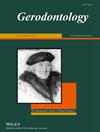Efficacy of a 3-Month Oral Function Management Protocol Incorporating Provision of Dietary Advice for Older Outpatients: A Randomised Controlled Trial
Abstract
Objective
This study aimed to examine the effects of an oral hypofunction management protocol incorporating oral function training and provision of dietary advice for 3 months on the nutritional status and oral function of older patients diagnosed with oral hypofunction.
Background
Oral hypofunction is associated with poor nutritional status, emphasising the need for management protocols incorporating provision of nutritional guidance and dietary advice. However, the efficacy of such protocols remains unclear.
Materials and Methods
This quasi-randomised controlled clinical trial included 80 patients (age ≥ 65 years) diagnosed with oral hypofunction who were divided into two groups (intervention and control). The intervention group was provided with dietary advice and instructed to perform daily oral function training. The patients' nutritional status and oral function were evaluated every 1.5 months. Intergroup and intragroup comparisons were made.
Results
The intervention group exhibited a significant increase in the mean Mini Nutritional Assessment score over the study period (baseline: 25.4 ± 3.2; after 3 months: 26.3 ± 3.0), whereas no significant difference was observed in the control group (baseline: 26.4 ± 2.4; after 3 months: 26.4 ± 2.7). The mean number of symptoms of poor oral function was 4.0 ± 1.0 and 3.9 ± 0.9 at baseline and 2.8 ± 1.3 and 3.0 ± 1.3 after 3 months in the intervention and control groups, respectively, with a significant difference within the groups.
Conclusion
Management protocols incorporating provision of nutritional advice effectively improved the oral function and nutritional status of older patients with oral hypofunction.

 求助内容:
求助内容: 应助结果提醒方式:
应助结果提醒方式:


